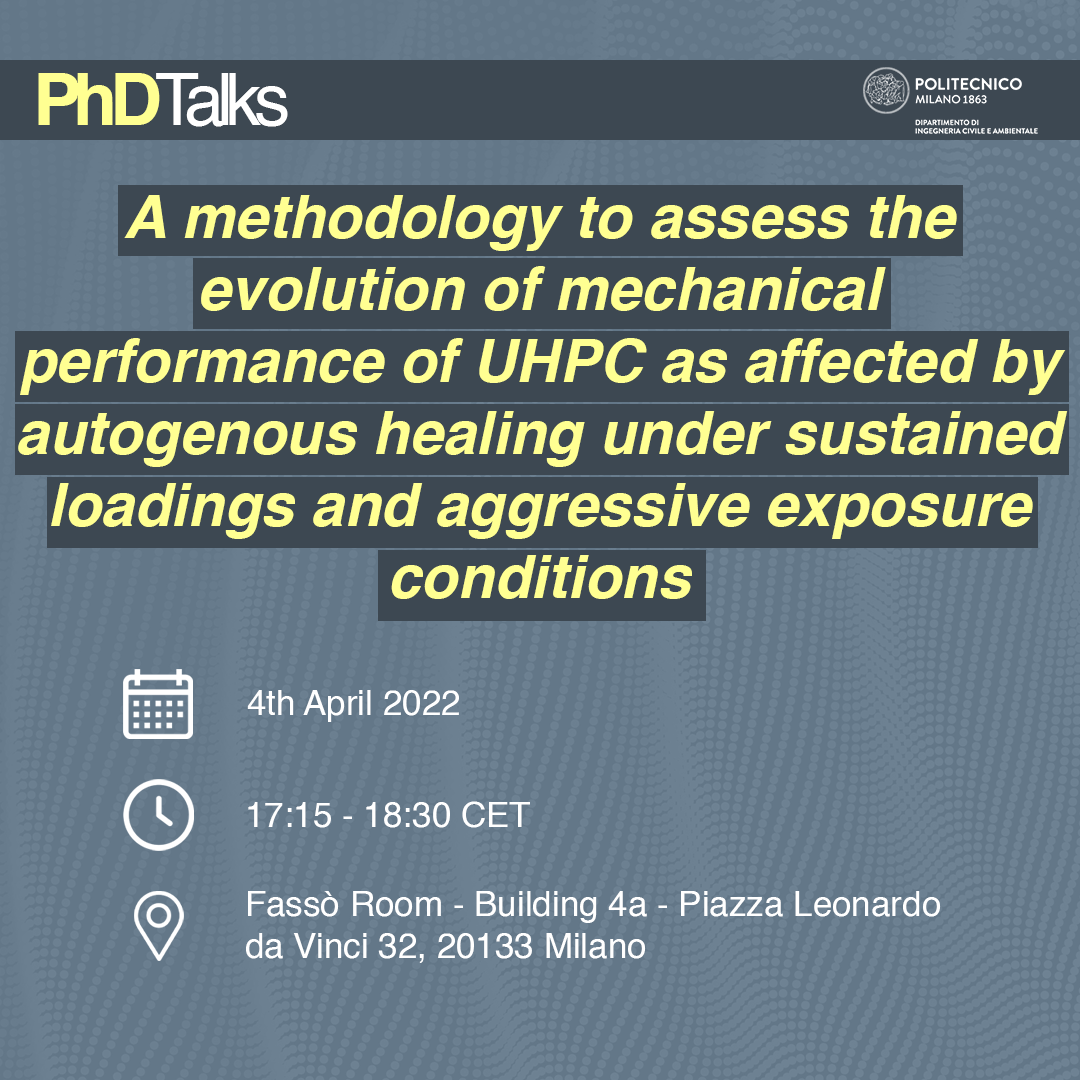
- Questo evento è passato.
PhDTalks | A methodology to assess the evolution of mechanical performance of UHPC as affected by autogenous healing under sustained loadings and aggressive exposure conditions
4 Aprile 2023 @ 17:15 - 18:30

La serie di seminari PhDTalks riprende con il primo appuntamento del 2023 che si terrà martedì 4 Aprile, dalle 17:15 alle 18:30 CET nell’aula Fassò (Edificio 4a – Piazza Leonardo da Vinci, 32).
PhDTalks è una serie di seminari e discussioni tra dottorandi. Gli eventi hanno lo scopo di fornire un luogo dove creare un network tra dottorandi ed entrare in contatto con i molti progetti sviluppati nel nostro dipartimento.
In questa occasione, il seminario sarà condotto da Marco Davolio e il titolo dell’intervento sarà “A methodology to assess the evolution of mechanical performance of UHPC as affected by autogenous healing under sustained loadings and aggressive exposure conditions“.
Sarà anche possibile seguire l’evento online accedendo alla stanza WebEx.
Abstract:
This study investigates the evolution of the performance of an Ultra-High Performance Concrete (UHPC) under simultaneous action of sustained loading and aggressive environmental exposure. UHPC mixes were investigated containing different functionalising micro- and nano-scale components to promote autogenous self-healing. In order to assess the healing capabilities in the different multi-action scenarios and the evolution of the mechanical response of the material over time, a tailored methodology was implemented, including non-destructive and destructive tests performed all along the scheduled exposure/healing times up to 12 months. In particular, an innovative set-up was designed to reproduce on the specimens the sustained flexural loading conditions a structure undergoes during its service life; the load was applied simultaneously with each of the three selected different exposures, to simulate the chloride and sulphate aggressive environments, besides a reference one. Multiple indices were defined to quantify the self-healing efficiency, which were further calibrated against experimental microscope crack observation as well as cross correlated with each other, as a further proof of the reliability of the proposed methodology. Two nominally identical specimens were tested for each condition, the first in four-point bending and the second in direct tension. To compare the results, a simplified five-point inverse analysis was adapted for beams with different slenderness, providing a quadrilinear constitutive law derived from the structural flexural behaviour of four-point bending tests. The results confirmed the material durability, especially in the cracked state, through its capacity of sealing the cracks and restoring original properties in short periods and preserving its load bearing capacity, thus providing solid argument for UHPC as the ideal candidate material for highly durable and sustainable structural applications in aggressive scenarios.
Speaker’s bio
Marco is a Ph.D. Candidate in Structural, Seismic, and Geotechnical Engineering (38th cycle) at Politecnico di Milano. He has BSc and MSc in Building Engineering and experience as a structural designer in a professional studio. Marco is currently developing carbon capture and uptake strategies for cementitious materials to reduce the environmental impact of the concrete construction industry. He is also cooperating with international companies such as Cemex and Energy Vault for the experimental fatigue characterization of Steel Fibre Reinforced Concretes and studying self-healing of Ultra-High Performance Concretes in the framework of European projects.
